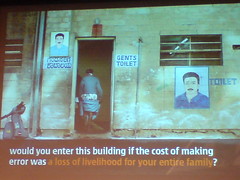LIFT07: Literacy, Communication and Design, Jan Chipchase
LIFT07: Literacy, Communication and Design, Jan Chipchase
Works for Nokia Design in Tokyo. The task: "design a phone for illiterate people".
Shows up the UN definition of literacy. The core function of a phone is to transcend space and time: crossing great distances and enabling asynchronous communication, in a personal and convenient manner.
It's better to solve the root causes of a problem than design around it.
Is there a point in our evolution where textual literacy becomes redundant?
 799 million illiterate people on the planet, 270m of them in India but illiteracy is everywhere. Lots of folks use devices that don't support their native language.
799 million illiterate people on the planet, 270m of them in India but illiteracy is everywhere. Lots of folks use devices that don't support their native language.
Phones designed in Helsinki increasingly get used in markets where there's much less structured (in-school) learning, like Brazil, India, etc. But there's also unstructured learning: visual observation, aural, tactile stuff. When most people talk about literacy they mean textual literacy. There also proximate literacy - using the literacy of those around you.
Most people propose an iconic interface to solve the problem. But icons are just another language. Icons need to be learned, are difficult to learn without support from text prompts, and need to vary across markets. They can be part of the solution, but don't solve the problem.
To what extent is textual literacy a barrier?
Nokia did 3-4 years of research in India, China, Nepal, etc.: home visits, interviews, shadowing, observation. Looking at where text prompts were barriers. How do illiterate people use TV? How do they tell the time? Use mechanical objects? Illiterate people have textual objects in the home, like calendars: how do they work with them?
Tasks involving time and contact management: how do you manage your contacts if illiterate? Know you're being paid enough? Millions of people do this daily.
What did we learn?
Illiterate people work long hours. 5-9, 7 days a week. These guys need to transcend time and space more than the rest of us. Literate tasks require assistance and more time. It involves giving up a lot of privacy. It's all possible, just not practical.
They can operate handsets, make local calls, answer calls. Barriers are national calls, editing, management. They tend to carry physical contact books.
Risks and consequences: how much trial and error can illiterate users do? There is a cost to expecting users to explore (poor mental models, risk of changing settings and altering phone).
Context helps us make decisions. How much contextual info can be provided on a phone interface?
What tasks can we delegate to others, to technology. The illiterate are like the very rich in that they have support for communication tasks: from a task-process design POV it's very similar.
Illiterate users are like us, only more so.
Q: What did it look like (the resulting phone)?
A: The interface looks like the current handset experience, but with lots of small incremental experience. Can't show you the product.
Q: What's your take on the Motophone? Is this the easy path?
A: It's a simplified device. I can't judge it. First product actively marketed as being appealing to illiterate people.... there's a social stigma here, will they go for it?
I must download this presentation and make everyone@FP read it.